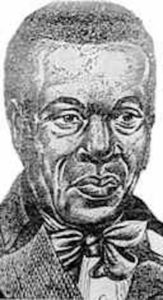
John Chavis
John Chavis, a Black educator and abolitionist, was born on this date in 1763.
He was born in North Carolina to a legally free family, which allowed him to pursue an education. Chavis arrived at Liberty Hall Academy in 1795, one year before George Washington's gift of 100 James River Company Stock shares. He was a student when the institution changed its name to Washington Academy. On November 19, 1800, Chavis graduated with honors and a license to preach. His academic performance attracted public attention because it contradicted the belief that Blacks were intellectually inferior to whites.
In 1808, Chavis founded a school for the children of white slave owners, training white children during the day and freeing black children at night. He prepared the white children for college by teaching them Latin and Greek. The school he opened in Raleigh was described as one of the best in the state. It surely was an excellent school, for some of the most powerful men in white society entrusted their sons’ education to Chavis.
His students included Priestly H. Mangum, brother of Senator Willie P. Mangum; Archibald E. and John L. Henderson, sons of Chief Justice Henderson; Governor Charles Manly; The Reverend William Harris; Dr. James L. Wortham; the Edwardses, Enlows (Enloes), Hargroves, and Horners; and Abraham Rencher who became Minister of Portugal and Territorial Governor of New Mexico.
Chavis maintained a long friendship with one of his white students, Willie P. Mangum, who was elected as a US Senator from North Carolina. For many years, they corresponded, and Chavis often criticized the senator's political positions. Chavis reportedly privately supported the abolition of slavery, disliked President Andrew Jackson, and opposed Mangum's advocacy of states' rights.
Chavis did not publicly support abolition and publicly condemned Nat Turner's slave rebellion, positions he likely took out of concern for his safety and to maintain his status as a freeman and position as an educator as southerners expelled free blacks and violently suppressed Turner's rebellion. His influence was far-reaching. A dedicated opponent of slavery, John Chavis was an influential abolitionist leader in the South. The circumstances surrounding his death in June 1838 remain unclear, although many suspect that he was murdered because of his work to better the lives of blacks.
African Americans/Voices of Triumph
by Dr. Henry Louis Gates, Jr.
Copyright 1993, TimeLife Inc.
The Negro in the American Revolution.
by Benjamin Quarles
University of North Carolina Press for
the Institute of Early American History and Culture,
Williamsburg, Va., 1961